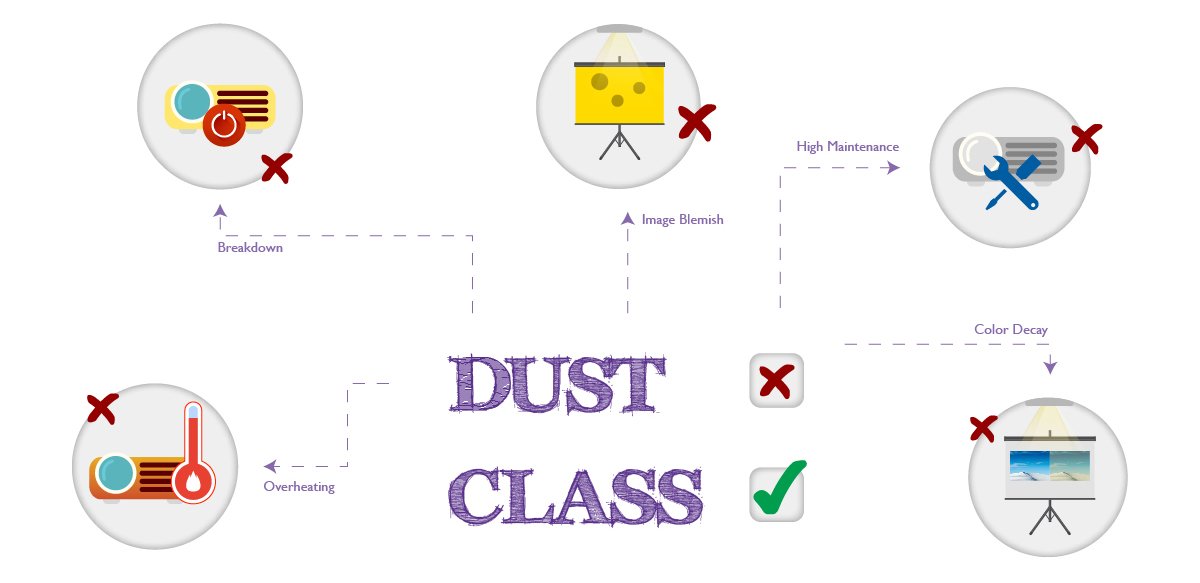Over the last few years, teaching has been evolving faster than ever before. Instead of relying on the traditional one-way, top-down method of teaching, new models require curriculums to attract students’ attention…
- BenQ
- 2018-08-31
A projector is 'indoor' display equipment. Thus, educational institutions in India never considered the outdoor environment when choosing them. That is now changing.
The reason: India's terrible air pollution situation.

The World Health Organisation says India has 11 of the 12 top cities in air pollution. Kanpur with a population of 3 million tops the list. Kanpur's PM 2.5 levels (the most hazardous particle) were an average of 319 micrograms per cubic metre.
Almost every Indian city is confronting this burden of air pollution. Higher educational institutions are also located in and around cities. It is a health hazard for students. It also increases the breakdown risk of display equipment, particularly projectors. Storms, industrial activities, transportation or even particles in education environments cause dust. Dust reduces the lifetime of projectors and inflates maintenance costs. Dust is the main source of damage to all projectors. Enter, dustproof classroom projectors to ensure reliability in a severe dust environment.
Dust hurts projectors
When air pollution was not a factor, choosing classroom projectors was easy. Educational institutions would choose the lowest priced amongst at least 3 vendors. It was a short-term, expedient approach.
Dusty playgrounds and the habit of opening classroom windows increased the concentration of harmful dust in indoor environments and the resulting impact on projectors. Dust increased maintenance costs and the total cost of ownership (TCO), which is an important factor in making a projector purchase decision.
Dust accumulation on internal parts of the projector caused image blemish, thermal issue, signal detection failure, brightness and colour decay. Dust accumulation on colour wheel sensors caused flickering, abnormal colour and shutdown. This disturbed classroom lessons and teaching quality suffered.
To address the above dust problems, educational institutions currently take the approach of regular maintenance. While preventive maintenance of projectors would be useful, it is reactive maintenance which is the norm. Reactive maintenance is expensive because of both direct and indirect costs (classroom interruptions). The severe dust environment under which classroom projectors operate, no form of maintenance is a long-term solution.
A truly durable solution to this ‘dust’ challenge of projectors, is to install projectors that reject dust from the outset. Only dustproof classroom projectors can achieve this. Dustproof projectors can deliver a tremendous learning impact in interactive classrooms, lecture halls and school meeting rooms.
Why dustproof classroom projectors
If educational institutions know the product design of dustproof projectors, it will not be difficult for them to understand why this type of display solution are best placed to solve ‘dust’ problems once and for all. And it has a lot to do with design. Let us look into it.
● Sealed optical engine
A dustproof projector's design keeps the dust away from all optics. In a DLP projector, the sealed design protects the chip, colour wheels and light components. This eliminates colour wheel sensor failures, visible spots on images and colour decay.
● Dust filters
Filters can prevent 90% of PM10 level particles such as pollen. Double filter layers can also block chalk residue and particles up to PM2.5. Filters achieve the required dust protection without restricting air flow. Filters that have built in timers remind users on replacement and reset.
● Advanced colour wheel sensor
Colour wheel sensors with anti-dust accumulation feature resist dust buildup by repelling dust. Traditional sensors do not repel dust. Some dustproof projectors also use a hall sensor. Hall sensors utilise magnetic signals for timing and resist dust accumulation. Even in severe dust environments, hall sensors are powerful to distinguish colours, thereby delivering precise alignment and uninterrupted projection.
All BenQ projectors in the Dust Guard series sport the above design.
Dust Guard technology-enabled BenQ projectors pass a series of tests in a simulated environment with large amounts of fine dust, soot, and milled cotton lint. This delivers pristine performance with high airflow not only in classrooms but even hazardous dusty environments.
BenQ education projectors provide a certified protection equal to the international dustproof protection rating of at least IP5X or better. (The IP Code is an international standard that rates a product’s protection against intrusions by foreign particles). Dust Guard technology enhances the durability and reliability of BenQ projectors and extends projectors’ lifetime while reducing maintenance frequency by 1/3 compared to other projectors. Dust Guard also eliminates colour decay, a common problem encountered by non-DLP projectors, via a sealed optical path design.
BenQ is the only professional dustproof solution provider to the education sector, providing reliable projector performance with low TCO to ensure teaching quality and save on maintenance costs.
Recommended Articles
-
Why You Should Keep Dust Out of Your Classroom
2019.03.12 -
5 Projector Features Every Education Leader Seeks
2017.12.02 -
Why India's Universities are Switching to DLP Laser Dustproof Projectors
Understand the reasons why Dustproof DLP Laser Projectors should be the top classroom projector of choice for India’s Universities.
2018.08.28